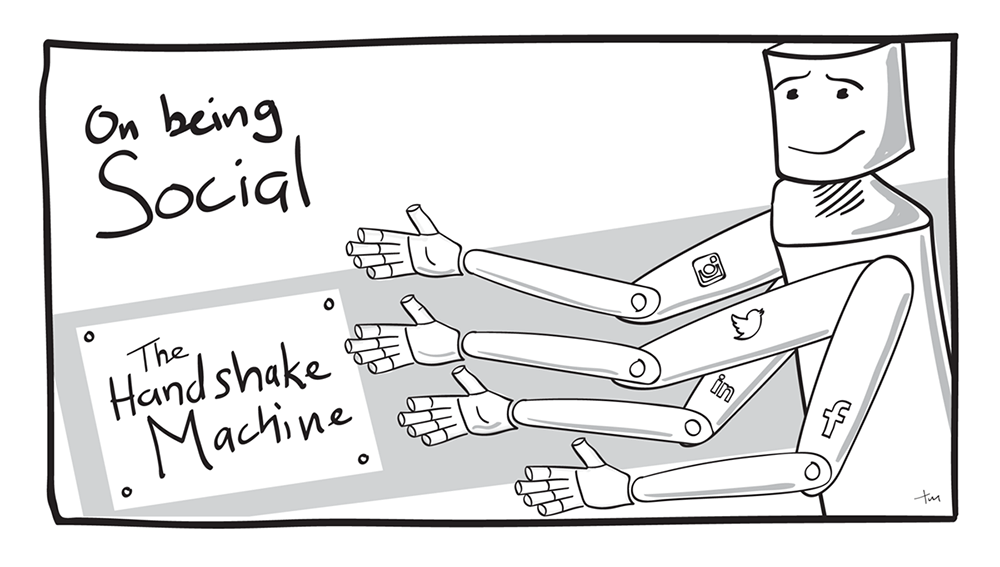On being social: Automating social media
This is part of a series of articles called On Being Social. The goal is to think about how individuals and brands should approach social media in a way that is authentic, healthy and beneficial. I’d love to hear your thoughts on these topics as I’m thinking through them–send me your comments through your social channel of choice or contact me directly.
The Handshake Machine
Imagine setting up a machine at your front door to shake hands with everyone who comes to visit. (This would actually be a great gimmick for the first person to do with it, but bear with the analogy for now.) This marvelous handshake machine greets your guests automatically as soon as they walk in. The machine shows your clients and friends that you’re great at automation and savvy about gizmos, but it doesn’t create much of a connection. Automating social media interactions can have the same effect–they feel inauthentic and forced, and can actually alienate your audience.
The impersonal autofollow
Like a font sommelier, Typegenius gives recommended pairings for common fonts. http://t.co/eDNCjrExUE from @TeamMuno pic.twitter.com/q6bkbRNSYS
— Tim Murray (@PaperbackPage) November 11, 2014
Consider these two automated “social” interactions: some time ago I mentioned Typegenius in a tweet. Typegenius is a website that suggests font pairings–Brandon Grotesque goes well with Petrona or Merriweather, or Lato would look really sharp with Roboto Slab. In the tweet I compared them to a “sommelier” who suggests wine pairings. Within minutes I was followed by a wine distributer–their automated follow mechanism obviously didn’t understand the simile. (They have since unfollowed me, probably automatically. (I do see the irony in referencing an automated font pairing resource in this context.)
In a similar way I posted this to Instagram a while ago, and got a “Like” by a selfie stick manufacturer who also later unliked (disliked?) it. Neither of those tone-deaf interactions is much of a problem for those brands, especially since I’m probably not their target market. But it does point to the inherent problem with automating your “social” interactions–you’re not actually being social. Instead of building a relationship, you’re highlighting the fact that your “relationship building” is inauthentic.
Autoposting across channels
Automatically reposting can be done well, if you’re intentional about creating something of value for your audience. A clumsy autopost from one social channel to another tells your audience in the second channel that their platform of choice is second tier to you. You risk alienating or annoying them, especially if the posts from the first channel don’t repost well. Don’t post a link on Twitter to your post on Facebook, for example. “I just posted this” followed by a link isn’t very compelling. Instead give careful thought to how you use different social channels for different audiences.
Antisocial vs. social media
There’s a case to be made for letting an algorithm take care of the mundane tasks in your online life, but go too far in that direction and you’ll miss out on a chance to connect to the people on the other side. Social media gives individuals and brands an opportunity to connect to a wide variety of people in a meaningful way. This opportunity is unprecedented in history and creates unique possibilities to engage with people who you would otherwise never meet.
Harvesting “likes” or getting a high follower count isn’t a great end goal. Don’t waste those possible connections by having your algorithms and autofollower do all the work. “Automated personal interactions” is an oxymoron, and a wasted opportunity.
To read more articles like this visit: Illustration, On Being Social, Social Media










